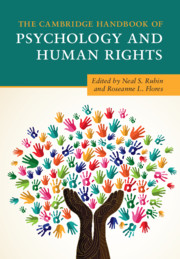Book contents
- The Cambridge Handbook of Psychology and Human Rights
- The Cambridge Handbook of Psychology and Human Rights
- Copyright page
- Dedication
- Contents
- Figures
- Tables
- Boxes
- Contributors
- Acknowledgments
- The Core International Human Rights Instruments and Their Monitoring Bodies
- Universal Human Rights Instruments
- Sustainable Development Goals
- Glossary of United Nations and Psychology Acronyms in the Handbook
- Introduction
- Part I History of Human Rights
- Part II The Intersection of Psychology and Human Rights
- Part III Contemporary Issues in Psychology and Human Rights
- Part IV Teaching, Research, and Training in Psychology and Human Rights
- Part V Future Directions
- 36 Human Rights and Reconciliation
- 37 The Australian Psychological Society’s Apology to Aboriginal and Torres Strait Islander People
- 38 The Role of Scientific Societies in Promoting and Protecting Human Rights and the Example of the American Psychological Association
- 39 Human Rights, Psychology, and Artificial Intelligence
- 40 Psychology, Human Rights, and the Implementation of the United Nations’ 2030 Agenda for Sustainable Development
- Index
- References
38 - The Role of Scientific Societies in Promoting and Protecting Human Rights and the Example of the American Psychological Association
from Part V - Future Directions
Published online by Cambridge University Press: 02 October 2020
- The Cambridge Handbook of Psychology and Human Rights
- The Cambridge Handbook of Psychology and Human Rights
- Copyright page
- Dedication
- Contents
- Figures
- Tables
- Boxes
- Contributors
- Acknowledgments
- The Core International Human Rights Instruments and Their Monitoring Bodies
- Universal Human Rights Instruments
- Sustainable Development Goals
- Glossary of United Nations and Psychology Acronyms in the Handbook
- Introduction
- Part I History of Human Rights
- Part II The Intersection of Psychology and Human Rights
- Part III Contemporary Issues in Psychology and Human Rights
- Part IV Teaching, Research, and Training in Psychology and Human Rights
- Part V Future Directions
- 36 Human Rights and Reconciliation
- 37 The Australian Psychological Society’s Apology to Aboriginal and Torres Strait Islander People
- 38 The Role of Scientific Societies in Promoting and Protecting Human Rights and the Example of the American Psychological Association
- 39 Human Rights, Psychology, and Artificial Intelligence
- 40 Psychology, Human Rights, and the Implementation of the United Nations’ 2030 Agenda for Sustainable Development
- Index
- References
Summary
Scientific societies have a unique role to play in the promotion and protection of human rights. Indeed, their activities in support of human rights have increased in the past four decades. Yet, such activities remain rare. Recognizing the connections between human rights and the knowledge and practice of psychology, the American Psychological Association (APA) is one of the few scientific membership organizations to integrate human rights language into its governance instruments and to pursue activities with a human rights focus. At the same time, the organization in recent years struggled to reconcile a perceived tension between human rights and national security interests. Adopting the APA as a case study, the chapter applies the Risse, Ropp, and Sikkin Spiral Model to explore how competing pressures from governments and other groups may lead scientific societies generally to take actions that undermine human rights norms and suggests a path forward for effective implementation by scientific societies of human rights.
- Type
- Chapter
- Information
- The Cambridge Handbook of Psychology and Human Rights , pp. 568 - 582Publisher: Cambridge University PressPrint publication year: 2020
References
- 1
- Cited by

